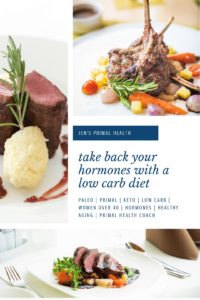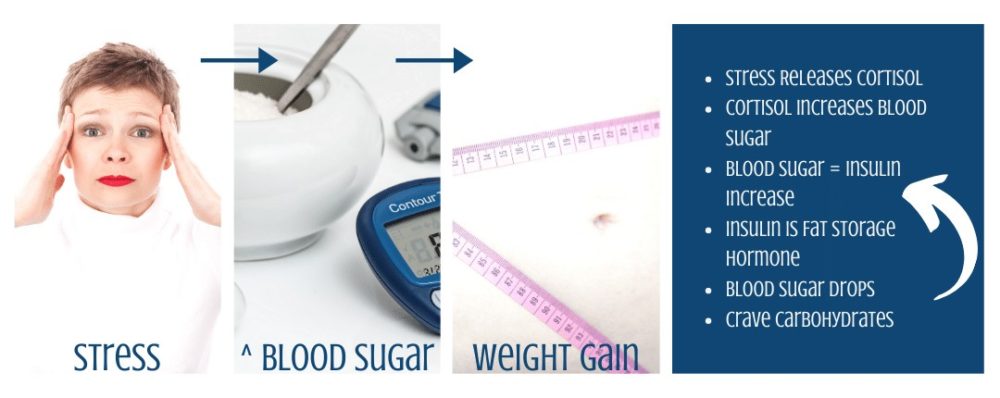I earn a small commission via affilate links at no extra cost to you.
I’m calling out some of my lady friends in this post. If I had a dollar for every time I heard “my hormones, my hormones, my hormones” while they’re throwing back a sugar-laden mocha-schmocha-latte… Sorry sweetie but you are the reason your “hormones” are causing you to gain weight and feel tired and moody. When we go out to eat and you polish off a plate of pasta followed by lava cake, I hate to be the bearer of bad news but that’s why you feel sleepy all of a sudden. The good news is that getting your hormones back in line is possible. With a low carb diet, you’ll naturally produce less insulin, the master hormone.
Insulin Is The Master Hormone
If you want to get your hormones in line you need to begin with your insulin response to food. When you eat carbohydrates they are metabolized into glucose. In order to store glucose your body releases insulin. Glucose is stored in the muscles and liver and when those stores are full the extra gets stored as body fat. The American diet is full of grain-based sugar-laden nonsense. When insulin is always present your body can’t access stored body fat to burn it. (Blog Post: Weight Loss In 6 Simple Steps)
Not only does insulin promote fat storage, it also creates systemic inflammation, interferes with your immune function, and disrupts your other hormones. A high insulin producing diet leads to accelerated aging and increased cancer risk. (Blog Post: How Snacking Causes Premature Aging) Furthermore, the more insulin you produce the hungrier you end up being. Even as a fat-adapted person, if I have a bit of a carb-fest, I’ll find myself hungrier than normal. The thing I’ll crave is carbohydrates. I’m fortunate in that I can recognize it for what it is and choose a big hearty steak instead.
Don’t get me wrong, insulin isn’t all bad. Our bodies do produce it for a number of reasons. Insulin allows cells of the liver, muscles, and fat cells to repair and store energy for future use. Insulin has growth-promoting properties that are important during puberty and pregnancy. During these times insulin levels and growth factors are elevated to promote success with maturation during these growth periods.
Insulin & Stress Hormones
When your body is conditioned to the high carbohydrate lifestyle any blood glucose dips trigger the fight or flight response. Your body perceives low blood glucose as a stressful event. If you don’t jump to fill your body with glucose it will release the stress hormone cortisol. What does cortisol do? Cortisol exists to help you in a life or death situation. Think primitively for a moment. Imagine you’re out in the woods and come upon a bear. The stress response exists to flood your body with glucose so that you can hopefully outwit and outrun your predator.
The problem is that in today’s carb-based world we activate cortisol not just when our blood sugar drops but also any time we are stressed. How does cortisol provide the body with glucose? It breaks down amino acids into glucose by a process called gluconeogenesis. If dietary amino acids aren’t floating around it gets them from your muscle tissue.
So…you workout in an attempt to build muscle and then spend your days slurping sugar from sun up to sundown. “But I don’t eat that much sugar”… Did you know that modern wheat causes a larger insulin response in the body than white table sugar does? One slice of whole wheat bread is worse than eating a Snickers Bar in terms of insulin response. (Blog Post: 12 Reasons To Go Grain Free)
If you don’t feel amped or hyper from this cortisol release and you feel like taking a nap it’s because you’ve abused this energy-boosting mechanism with years of high carbohydrate eating. Chronically high insulin and cortisol suppresses testosterone (necessary for muscle growth). It also suppresses DHEA (Dehydroepiandrosterone) which acts as a precursor for the synthesis of testosterone and estrogen. Both of which are sex hormones necessary for healthy reproductive tissues, body tissues, and bone mass. [1]
Insulin & Hunger Hormone Leptin
Over time excess insulin production can lead to insulin resistance. Insulin resistance is where the cells of the body become resistant to insulin’s storage signal at the molecular level. Cells have been bombarded with storage signals and they finally say “no more”. This becomes a problem because the brain thinks the body is starved for nutrients.
Why is this so? There are two main reasons. The hunger-regulating hormone leptin works in the brain to send signals to the body that you are full. The critical point is when leptin crosses the blood-brain barrier. If leptin cannot make it across the hunger response isn’t turned off no matter how much leptin there may be in the bloodstream.
Unfortunately, this is a negative feedback loop. Insulin resistance produces more insulin resistance and when the liver is insulin resistant it begins releasing glucose into the blood. Glucose is released, insulin is released, the body is insulin resistant, glucose gets turned into triglycerides and stored as body fat, the body believes it’s starved for energy so the liver releases more glucose. It repeats over and over plus leptin is triggering carbohydrate cravings.
Leptin & All Those Triglycerides
Researchers from St. Louis and Japan (Banks A, Coon AB, Robinson SM, Moinuddin A, Shultz JM, Nakaoke R, Morley JE, et all), discovered that triglycerides induce leptin resistance at the blood-brain barrier. When triglyceride levels are high they block this passage of leptin where it can signal that the body has had enough food and is satisfied.
Insulin & Thyroid Hormones
Excessive insulin interferes with your thyroid hormones. Remember the insulin resistance I mentioned above? It interferes with thyroid hormone production. What does your thyroid do? It regulates your metabolism, energy levels, brain function, and it supports the growth of cells and tissues. The thyroid gland releases T4 but it’s up to the liver to convert T4 to T3. When your liver is insulin resistant the conversion of T4 to T3 drops dramatically.
Insulin & Sex Hormones
One of the most prevalent conditions affecting women and their hormones that many have reversed with a low carbohydrate diet is PCOS. (PolyCystic Ovarian Syndrome). When excessive insulin is present an enzyme called 17,20 lyase converts estrogen into dihydrotestosterone (DHT). That conversion often results in PCOS which has symptoms very similar to low thyroid function. Metabolic syndrome (insulin resistance with endocrine (hormone) dysfunction) is self-perpetuating as I mentioned above. Insulin resistance and PCOS often go hand in hand. Insulin resistance causes hormonal imbalances, such as increased testosterone and other androgens (masculinizing hormones), associated with PCOS. [3]
Men have their own issues too. Aromatase is an enzyme produced in fat tissue. When it combines with insulin it converts testosterone into estrogen. It’s responsible for the low testosterone epidemic we see in today’s world. [3]
Leptin, Triglycerides, & Low-Carb Diet
It is a well-known fact that a low-carb diet results in a dramatic reduction in triglyceride levels. This reduction ensures that leptin can get to the brain to successfully reduce hunger. The reduction in triglycerides happens pretty fast once carb intake is reduced.
Once leptin gets to the brain it boosts thermogenesis (fat burning) and so the metabolic rate increases. This is also one of the main reasons that low-carb wins the battle over low-fat diet plans. A low carb diet can result in a naturally lower caloric intake as people are simply not as hungry as they are when eating many carbs.
Researchers at Temple University School of Medicine found that lowering carb intake alters blood insulin levels in ways to promote appetite suppression and satiety.
10 obese people with type 2 diabetes were placed in the hospital 14 days, and each bite of food they took was analyzed and daily blood samples were taken. For 7 days they ate a normal diet, then for 14 days, their carb intake was limited to 21 grams per day, and they were allowed to eat as much protein and fat as they wanted.
➢ In the end, analysis showed they ate 1/3 fewer calories on the low carb days, than they ate on the 14 days of a regular diet that included carbs
➢ They lost an average of 3.5 pounds during the low carb days
➢ Their blood insulin levels dropped by 23%, which resulted in the suppression of appetite.
This is one of the main reasons that keto and other low carb plans work very well for those who have struggled all their lives white-knuckling it through the various low calorie and low-fat diets they have endured. In many cases, there is no willpower struggle because hunger is simply not an issue. It opens the door for a new lifestyle to take over naturally.
Your Thyroid On A Low Carb Diet
The ultimate low carb diet is the carnivore diet. I’ve chosen to use it as an example in this case because some speculate that goitrogens that are found in some plant foods may hinder thyroid function. A low carbohydrate diet is associated with lower levels of circulating thyroid hormone. Therefore many think that they need carbohydrates to rescue their thyroid. Low levels of thyroid hormone can be completely normal as long as a person’s physiologic function is fine. Furthermore, when a person restricts carbohydrates the body simply doesn’t need as much T3. In a nutshell, if you don’t suffer any symptoms associated with hypothyroidism while following a low carbohydrate diet…do you need meds? Doctors like to keep everyone in the “normal” range but where does the range come from? Sick people. People who are well and healthy don’t sign up for research studies. According to Dr. Baker people are seeing improvements with Hashimoto’s while following a carnivore diet…
A Low Carbohydrate Diet To Improve Your Hormones
Books have been written on these subjects and I don’t intend to go to that length in a blog post. Hopefully, you get the gist from above. Our lifestyle where we are swimming in insulin isn’t doing us any favors. How does a low carbohydrate diet help? It reduces the insulin response.
What does a low carbohydrate diet look like?
Basically It’s Simply Real Food Without Any Beige Starchy Ingredients
If anything I enjoy food more now because everything is full of flavor. No more starchy canvasses that I’m trying to dress up. The food is the flavor and it doesn’t have sketchy ingredient lists.
Not only will weight loss become simple you’ll also dial down your stress hormones and potential for all of the diseases associated with metabolic syndrome. (heart disease, liver disease, kidney disease, Alzheimer’s, dementia, type 2 diabetes, cancer, neuropathy, glaucoma, and others)
How do you make new habits like this stick? (Blog Post: 5 Steps To Make Health Habit Changes That Last) If you need more help this is what I do. I help people find their path to the health they desire with personalized coaching. You can also get started with meal planning for weight loss here.
[1] Discover DHEA’s Possible Uses and Benefits: https://articles.mercola.com/vitamins-supplements/dhea.aspx
[2] Fructose-induced leptin resistance exacerbates weight gain in response to subsequent high-fat feeding: https://www.ncbi.nlm.nih.gov/pmc/articles/PMC2584858/
[3] Primal Fat Burner: Live Longer, Slow Aging, Super-Power Your Brain, and Save Your Life with a High-Fat, Low-Carb Paleo Diet, https://amzn.to/2S6T6dA
[4] Effect of a low-carbohydrate diet on appetite, blood glucose levels, and insulin resistance in obese patients with type 2 diabetes: https://www.ncbi.nlm.nih.gov/pubmed/15767618/
[5] The Carnivore Diet, Shawn Baker MD, https://amzn.to/2GyudCb
Originally posted on January 29, 2020 @ 21:26












Thanks for checking it out!
I’m glad you found the bravery to say hello. Thanks for stopping by and please don’t hesitate to let me know the kinds of things you’re interested it.